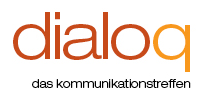The difficulty of saying good bye to top-down communication
Last Tuesday I took part on a discussion round in Düsseldorf, Germany. It was about the changing of the communication of enterprises due to web2.0. Reflecting the evening, I find it quite interesting what it might have meant in terms of the new web and its potential users in Germany. **To put ahead, I share the opinion that web2.0 has reached Germany quite late **-- especially if you take a look at the enterprise sector. This event was mainly directed towards external communication or public relation experts, and not so focused on knowledge sharing approaches. Next to me sat Thomas Knüwer, a journalist from the the German Handelsblatt and Marc Pohlmann, who eagerly talked about direct one to one marketing and Wieland Stützel from Frankfurt airport.
 Less people, than originally registered, showed up -- I even had my doubts the visitors were interested in knowledge sharing. My basic statement was that German companies underestimate the potential of web2.0 even though web2.0 offers new incentives for knowledge sharing, opens new ways of participation and questions hierarchies. The technology is secondary; the communication and exchange sets the dynamic.
Less people, than originally registered, showed up -- I even had my doubts the visitors were interested in knowledge sharing. My basic statement was that German companies underestimate the potential of web2.0 even though web2.0 offers new incentives for knowledge sharing, opens new ways of participation and questions hierarchies. The technology is secondary; the communication and exchange sets the dynamic.
Maybe it was the rain, maybe they had already heard enough of web2.0, or they simply did not find it interesting enough. As I am following closely a lot of reportages in the old media, I think not so much has been reported, and when so, it is often reduced to the usual sites (wikipedia, youtube). It was interesting to see and hear that for many communication experts, knowledge sharing is of minor interest. ** Unfortunately, in my opinion, most people wanted to get a guideline or solution: How can I influence this community? How can I get my message to the client? And lastly, how to make money with it?**
But on the podium were four people arguing in favour of the authentic conversation about the web and how deeply it will change communications. Sadly, that seemed to bored the public relation audience. So, is it the companies or the employees who are not ready for web2.0? Can top-down internal and external communication specialists really have any benefit from it? Right then I had my doubts. But again, It showed me how far the participatory web is from mainstream or normal life organizations. It also showed me that there is a big skepticism about "just another web tool". It is definitely still too far away from everyday practice within organizations.
Not surprisingly, first remarks from the audience were how to apply it and what will it change? My points about open source collaboration and open networking of organizations did not seem to make them curious. However I found the following quotes nice:
- Marc Pohlmann: "This web shift is not about coverage, it is about one's niche audience and about having a conversation with it."
- Thomas Knüwer: "There is not more trash in the Internet it is just so much easier to find it."
- Wieland Stützel: "Nowadays structured organizations are so much in an internal competition between departments - how shall they possible work together and collaborate and go outside."
I found it all quite interesting, but it did not seem to engage the audience. I guess we did not achieve the conversation. However, this was not my first time in this kind of events, and still, I am often struck about people's desire for a road-map of how to deal with it and to influence it, rather than just say 'that sounds interesting let's check it out and experiment with it.'